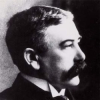Ferdinand de Saussure

Ferdinand de Saussure
Ferdinand Mongin de Saussurewas a Swiss linguist and semiotician. His ideas laid a foundation for many significant developments both in linguistics and semiology in the 20th century. He is widely considered one of the founders of 20th-century linguistics and one of two major foundersof semiotics/semiology...
NationalitySwiss
ProfessionEducator
Date of Birth26 November 1857
CountrySwitzerland
historical examination principles
The critical principle demanded an examination, for instance, of the contribution of different periods, thus to some extent embarking on historical linguistics.
conservative language initiative
Of all social institutions language is least amenable to initiative. It blends with the life of society, and the latter, inert by nature, is a prime conservative force.
study range interest
It is only since linguistics has become more aware of its object of study, i.e. perceives the whole extent of it, that it is evident that this science can make a contribution to a range of studies that will be of interest to almost anyone.
issues movement different
In general, the philological movement opened up countless sources relevant to linguistic issues, treating them in quite a different spirit from traditional grammar; for instance, the study of inscriptions and their language. But not yet in the spirit of linguistics.
study language grammar
Henceforth, language studies were no longer directed merely towards correcting grammar.
ideas goes-on language
Everyone, left to his own devices, forms an idea about what goes on in language which is very far from the truth.
might said evoke
Nearly all institutions, it might be said, are based on signs, but these signs do not directly evoke things.
expression mass our-thoughts
Psychologically our thought-apart from its expression in words-is only a shapeless and indistinct mass.
law differences facts
The ultimate law of language is, dare we say, that nothing can ever reside in a single term. This is a direct consequence of the fact that linguistic signs are unrelated to what they designate and that, therefore, 'a' cannot designate anything without the the aid of 'b' and vice versa, or, in other words, that both have value only by the difference between them.
communication law community
Language furnishes the best proof that a law accepted by a community is a thing that is tolerated and not a rule to which all freely consent.
differences ideas sound
A linguistic system is a series of differences of sound combined with a series of differences of ideas.
would-be study language
In the lives of individuals and societies, language is a factor of greater importance than any other. For the study of language to remain solely the business of a handful of specialists would be a quite unacceptable state of affairs.
independent firsts speech
Within speech, words are subject to a kind of relation that is independent of the first and based on their linkage: these are syntagmatic relations, of which I have spoken.
nebula language uncharted
Without language, thought is a vague, uncharted nebula.